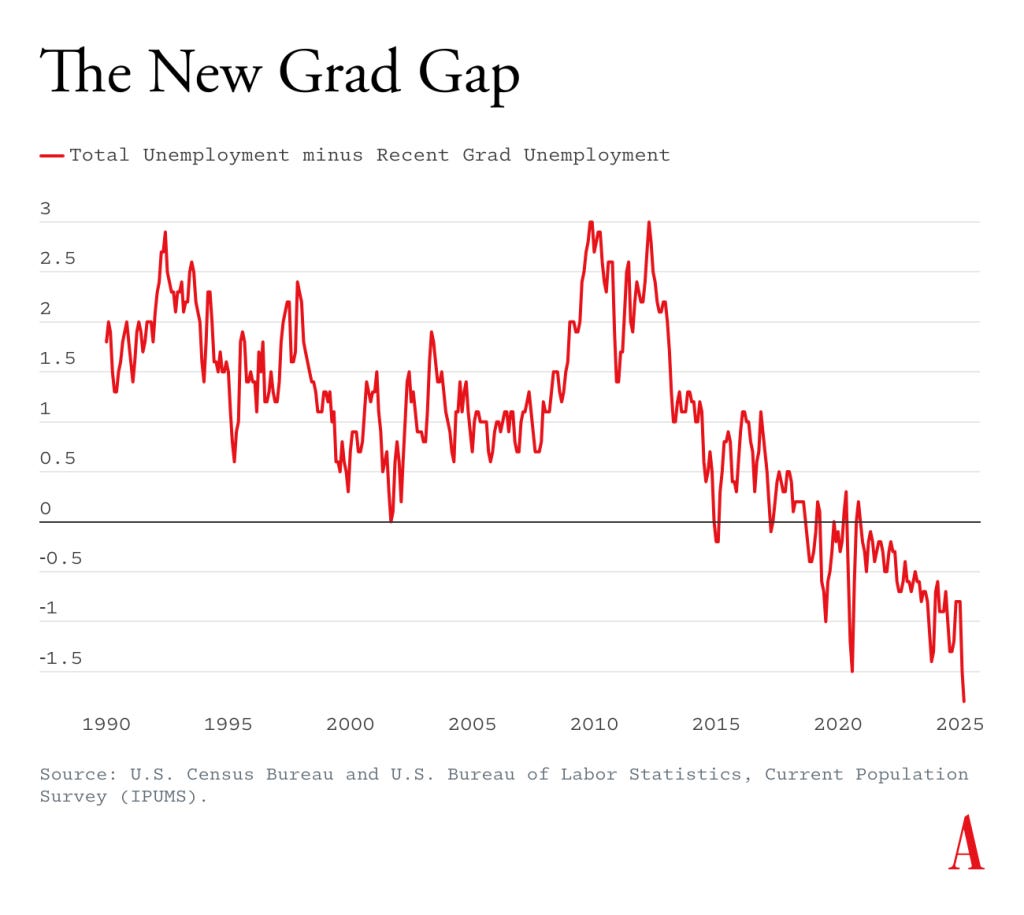Derek Thompson Tells Us About The Power of Weak Links
Derek Thompson has a Substack now, and you should all subscribe (duh).
His latest post has an interesting chart, and I use "interesting in a decidedly euphemistic sense:
The simple way to read this chart is to think of total unemployment in the economy as being, say 5%. The Grad Gap is (Total Unemployment - Recent Grad Unemployment). The only way the Grad Gap can be negative (as it has been since 2020) is if Recent Grad Unemployment is even higher than 5%.
Or, if you prefer to put it as plainly as possible, young folks who have recently left college with a degree are finding it hard to get a job.
It's Happening
And a lot of us (myself included) think it is going to get a whole lot worse. Now, before we say the magic phrase (this must be because of AI, right?!), hold on to your horses:
It’s hard to find conclusive economic evidence that AI is destroying jobs. News cycles move quickly, technology moves slower, and macroeconomics moves slowest. The tempest might not be on us, but this is the time to look for storm clouds.
If anybody could provide a useful forecast, I thought, it would have to be college career offices, who have a panoramic view of the entry-level economy and their own students’ anxieties. So, I placed several calls to directors of career offices at universities around the country to ask the same question: What, if anything, feels uniquely concerning about this economic moment?
And so Derek, having spoken to those folks at the directors of career offices (placement cells, in our English), thought about what he has listened to, and reached a conclusion.
You can absolutely, he goes on to say, let go of those horses:
“We’re all holding our breath,” said Louise Jackson, director of the career center at the University of Michigan. “I think we’re at the front edge of a significant transition as it relates to labor markets and skills, and AI is already distorting the market,” said David Gaston, executive director at the career center at Georgia Tech. “The market is absolutely softening, and from what I see, it’s influenced by both economic uncertainty and AI,” said Mary Andrade, senior director of career success at Purdue University. “I have absolutely heard that some employers are already replacing new grad skills with artificial intelligence. It’s not just in the tech fields, or coding, it’s across a lot of white-collar firms.” Yikes.
AI, AI Everywhere, And Not A Job In Sight
And it's not just a job that has become hard to get. Getting an interview in which you can be rejected for the job you're looking for has itself become a lot harder. And why?
If you have even a single horse left with you, hit the jettison button:
Twenty years ago, it was rare for students to apply to more than 20 positions as seniors. But new technology to customize resumes and personal statements allows people to transform one application into dozens, almost instantaneously. At the same time, new hiring platforms, such as Handshake, have made it easier for young people to find hundreds of plausible jobs in the same place. “We’re now seeing students sending 300 applications a year. Sometimes it’s 500 or even 1,000 applications from one student in one year,” said Jackson. “This wasn’t possible before AI, and it’s still accelerating.”
A college senior applying to several hundred jobs—much less 1,000—is difficult for this geriatric Millennial to comprehend. But now imagine 2 million college graduates applying to an average of, say, 50 or 100 jobs. That’s 100 to 200 million job applications for entry-level positions across the country, every year. It’s impossible for carbon-based Human Resources departments to go through all that. No surprise, then, that many employers are turning to silicon, instead.
TMKK?
How does one stand out in such a field? How does one get past a pile of two hundred million job applications and into round two? You have two choices: make your application so good that silicon-based HR departments let you pass through to Round 2.
Or, even better, make sure that you don't enter that pile in the first place:
https://twitter.com/NGKabra/status/1455231177980190723
Navin, in this Twitter thread, talks about how hiring departments can't possibly deal with 5-100 job applications, which should make you think that this thread was written back when dinosaurs roamed the earth .
(And you'd be right. It was written in 2021, or 1BC. Before ChatGPT)
And of course, the reason I share this Twitter thread because the main point from this tweet becomes even more important. If it was important to avoid the screening process back in ancient times, it is even more important that your CV doesn't go into that even bigger pile today.
And how do you make sure that your CV doesn't go into that pile?
One: don't have a CV. Your portfolio of work online should speak for itself.
Two: don't apply by going to the Careers page of a firm. Have someone in that firm refer you for a particular position.
And how do you maximize the chances of you knowing just the right guy in that firm to act as your referrer?
Build weak links!
I've said it before, as have lots of other folks, and I'll say it again: develop your networks! Your weak links are your superpower, and a day that you spend not working on your network is a day wasted.


